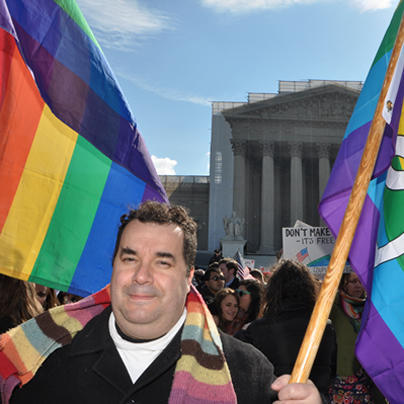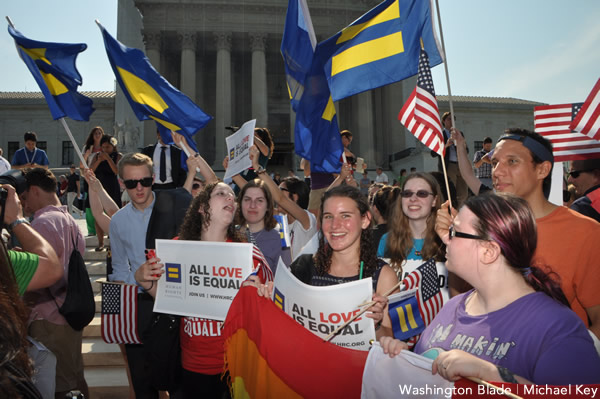Politics
DOMA ruling quickens march toward marriage equality
Officials in Ohio, Pa., Missouri, N.M. cite court decision


The Supreme Court decision against DOMA has boosted marriage equality activism. (Washington Blade photo by Michael Key)
Not even one month after the Supreme Court’s historic decision striking down Section 3 of the Defense of Marriage Act, the effects of the ruling are already proliferating as legal authorities throughout the country reinterpret laws to advance marriage rights for gay couples.
Almost like a domino effect, public officials and judges in Ohio, New Mexico, Pennsylvania and Missouri this week alone have acted to advance marriage equality by drawing on the decision in Windsor v. United States as part of their reasoning.
Doug NeJaime, a gay law professor at the University of California, Irvine, said this movement so soon after the Windsor ruling “was anticipated” given the language that Associate Justice Anthony Kennedy used in his opinion.
“Given the flurry of activity, and the quick decisions coming out of places like Ohio, this may mean that the Supreme Court may not be able to avoid the question regarding the constitutionality of state marriage bans as long as some of the justices may hope,” NeJaime said. “Clearly in Perry they were able to push the issue off for a bit, but it doesn’t seem they will be able to avoid the question for more than a few years at most.”
In Ohio, U.S. District Judge Timothy Black drew on the precedent set in Windsor as part of his reasoning in his 15-page decision affording a temporary order requiring Ohio to recognize the marriage of James Obergefell and John Arthur.
“While the holding in Windsor is ostensibly limited to a finding that the federal government refuse to recognize state laws authorizing same-sex marriage, the issue whether States can refuse to recognize out-of-state same-sex marriages is now surely headed to the fore,” Black writes. “Indeed, just as Justice Scalia predicted in his animated dissent, by virtue of the present lawsuit, ‘the state law-shoe’ has now dropped in Ohio.”
In Missouri, the State Supreme Court has asked attorneys involved in a gay death benefits case for an additional briefing in light of the Supreme Court’s decision against DOMA. Kelly Glossip was denied the benefits of her partner, Missouri State Highway Patrol Cpl. Dennis Engelhard, who died in the line of duty in 2009.
In Pennsylvania’s Montgomery County, where the County Commission has directed clerks to distribute marriage licenses to gay couples, the Windsor decision is cited again. Democrat Josh Shapiro is indirectly quoted by the Associated Press as saying the commission believes it has authority to distribute marriage licenses because of the Supreme Court decision against DOMA.
New Mexico Attorney General Gary King also makes reference to Windsor in his 29-page opinion in which he announces he won’t defend a state law in a lawsuit seeking marriage equality. But the decision here is mentioned briefly in a citation along with state marriage lawsuits such as Massachusetts’ Goodridge v. Department of Public Health and Iowa’s Varnum v. Brien.
New application of the Windsor decision can also be seen at the federal level. On Thursday, the Federal Election Commission is set to vote on allowing married same-sex couples to make joint political donations from an individual bank account.
The FEC has previously determined that married gay couples were ineligible to make such contributions under DOMA, but with Section 3 of that law deemed unconstitutional, the commission on Friday published a new draft opinion saying it “now revisits the question.”
Suzanne Goldberg, a lesbian and co-director of Columbia University’s Center for Gender & Sexuality Law, said the “pace has been quick, and it’s only getting quicker” with respect to the advancement of marriage equality after the DOMA ruling.
“Part of the cascade of change in the direction of marriage equality comes from the power of Justice Kennedy’s decision striking down DOMA,” Goldberg said. “They could have won, but with a less powerful opinion, which might not have motivated as many government officials to advance marriage equality, but the opinion is powerful and makes clear that discrimination in marriage is unconstitutional.”
In addition to the DOMA ruling, Goldberg also attributed the advancement of marriage equality to elected officials wanting to catch up to other politicians who have endorsed same-sex marriage. Additionally, she said a general cultural shift in the United States and high degree of acceptance of the court ruling is responsible.
“There can be no question that momentum has been building over the past two years, and it’s increased dramatically with the court striking down DOMA,” Goldberg concluded. “I think we can expect the pace of change to continue, but with bumps along the way.”
Congress
Congress passes ‘Big, Beautiful Bill’ with massive cuts to health insurance coverage
Roughly 1.8 million LGBTQ Americans rely on Medicaid

The “Big, Beautiful Bill” heads to President Donald Trump’s desk following the vote by the Republican majority in the U.S. House of Representatives Thursday, which saw two nays from GOP members and unified opposition from the entire Democratic caucus.
To partially offset the cost of tax breaks that disproportionately favor the wealthy, the bill contains massive cuts to Medicaid and social safety net programs like food assistance for the poor while adding a projected $3.3 billion to the deficit.
Policy wise, the signature legislation of Trump’s second term rolls back clean energy tax credits passed under the Biden-Harris administration while beefing up funding for defense and border security.
Roughly 13 percent of LGBTQ adults in the U.S., about 1.8 million people, rely on Medicaid as their primary health insurer, compared to seven percent of non-LGBTQ adults, according to the UCLA School of Law’s Williams Institute think tank on sexual orientation and gender identities.
In total, the Congressional Budget Office estimates the cuts will cause more than 10 million Americans to lose their coverage under Medicaid and anywhere from three to five million to lose their care under Affordable Care Act marketplace plans.
A number of Republicans in the House and Senate opposed the bill reasoning that they might face political consequences for taking away access to healthcare for, particularly, low-income Americans who rely on Medicaid. Poorer voters flocked to Trump in last year’s presidential election, exit polls show.
A provision that would have blocked the use of federal funds to reimburse medical care for transgender youth was blocked by the Senate Parliamentarian and ultimately struck from the legislation — reportedly after the first trans member of Congress, U.S. Rep. Sarah McBride (D-Del.) and the first lesbian U.S. senator, Tammy Baldwin (D-Wis.), shored up unified opposition to the proposal among Congressional Democrats.
Congress
Ritchie Torres says he is unlikely to run for NY governor
One poll showed gay Democratic congressman nearly tied with Kathy Hochul

Gay Democratic Congressman Ritchie Torres of New York is unlikely to challenge New York Gov. Kathy Hochul (D) in the state’s next gubernatorial race, he said during an appearance Wednesday on MSNBC’s “Morning Joe.”
“I’m unlikely to run for governor,” he said. ““I feel like the assault that we’ve seen on the social safety net in the Bronx is so unprecedented. It’s so overwhelming that I’m going to keep my focus on Washington, D.C.”
Torres and Hochul were nearly tied in a poll this spring of likely Democratic voters in New York City, fueling speculation that the congressman might run. A Siena College poll, however, found Hochul leading with a wider margin.
Back in D.C., the congressman and his colleagues are unified in their opposition to President Donald Trump’s signature legislation, the “Big Beautiful Bill,” which heads back to the House after passing the Senate by one vote this week.
To pay for tax cuts that disproportionately advantage the ultra-wealthy and large corporations, the president and Congressional Republicans have proposed massive cuts to Medicaid and other social programs.
A provision in the Senate version of the bill that would have blocked the use of federal funds to reimburse medical care for transgender youth was blocked by the Senate Parliamentarian and ultimately struck from the legislation, reportedly after pressure from transgender U.S. Rep. Sarah McBride (D-Del.) and lesbian U.S. Sen. Tammy Baldwin (D-Wis.).
Torres on “Morning Joe” said, “The so-called Big Beautiful Bill represents a betrayal of the working people of America and nowhere more so than in the Bronx,” adding, “It’s going to destabilize every health care provider, every hospital.”
Congress
House Democrats oppose Bessent’s removal of SOGI from discrimination complaint forms
Congressional Equality Caucus sharply criticized move

A letter issued last week by a group of House Democrats objects to Treasury Secretary Scott Bessent’s removal of sexual orientation and gender identity as bases for sex discrimination complaints in several Equal Employment Opportunity forms.
Bessent, who is gay, is the highest ranking openly LGBTQ official in American history and the second out Cabinet member next to Pete Buttigieg, who served as transportation secretary during the Biden-Harris administration.
The signatories to the letter include a few out members of Congress, Congressional Equality Caucus chair and co-chairs Mark Takano (Calif.), Ritchie Torres (N.Y.), and Becca Balint (Vt.), along with U.S. Reps. Nikema Williams (Ga.), Hank Johnson (Ga.), Raja Krishnamoorthi (Ill.), Delia Ramirez (Ill.), Joyce Beatty (Ohio), Lloyd Doggett (Texas), Eleanor Holmes Norton (D.C.), Josh Gottheimer (N.J.), and Sylvia Garcia (D-Texas).
The letter explains the “critical role” played by the EEO given the strictures and limits on how federal employees can find recourse for unlawful workplace discrimination — namely, without the ability to file complaints directly with the Employment Opportunity Commission or otherwise engage with the agency unless the complainant “appeal[s] an agency’s decision following the agency’s investigation or request[s] a hearing before an administrative judge.”
“Your attempt to remove ‘gender identity’ and ‘sexual orientation’ as bases for sex discrimination complaints in numerous Equal Employment Opportunity (EEO) forms will create unnecessary hurdles to employees filing EEO complaints and undermine enforcement of federal employee’s nondiscrimination protections,” the members wrote in their letter.
They further explain the legal basis behind LGBTQ inclusive nondiscrimination protections for federal employees in the EEOC’s decisions in Macy v. Holder (2012) and Baldwin v. Foxx (2015) and the U.S. Supreme Court’s decision in Bostock v. Clayton County (2020).
“It appears that these changes may be an attempt by the department to dissuade employees from reporting gender identity and sexual orientation discrimination,” the lawmakers wrote. “Without forms clearly enumerating gender identity and sexual orientation as forms of sex discrimination, the average employee who experiences these forms of discrimination may see these forms and not realize that the discrimination they experienced was unlawful and something that they can report and seek recourse for.”
“A more alarming view would be that the department no longer plans to fulfill its legal obligations to investigate complaints of gender identity and sexual orientation and ensure its
employees are working in an environment free from these forms of discrimination,” they added.
-

 U.S. Supreme Court3 days ago
U.S. Supreme Court3 days agoSupreme Court to consider bans on trans athletes in school sports
-

 Out & About3 days ago
Out & About3 days agoCelebrate the Fourth of July the gay way!
-

 Virginia3 days ago
Virginia3 days agoVa. court allows conversion therapy despite law banning it
-

 Federal Government5 days ago
Federal Government5 days agoUPenn erases Lia Thomas’s records as part of settlement with White House












